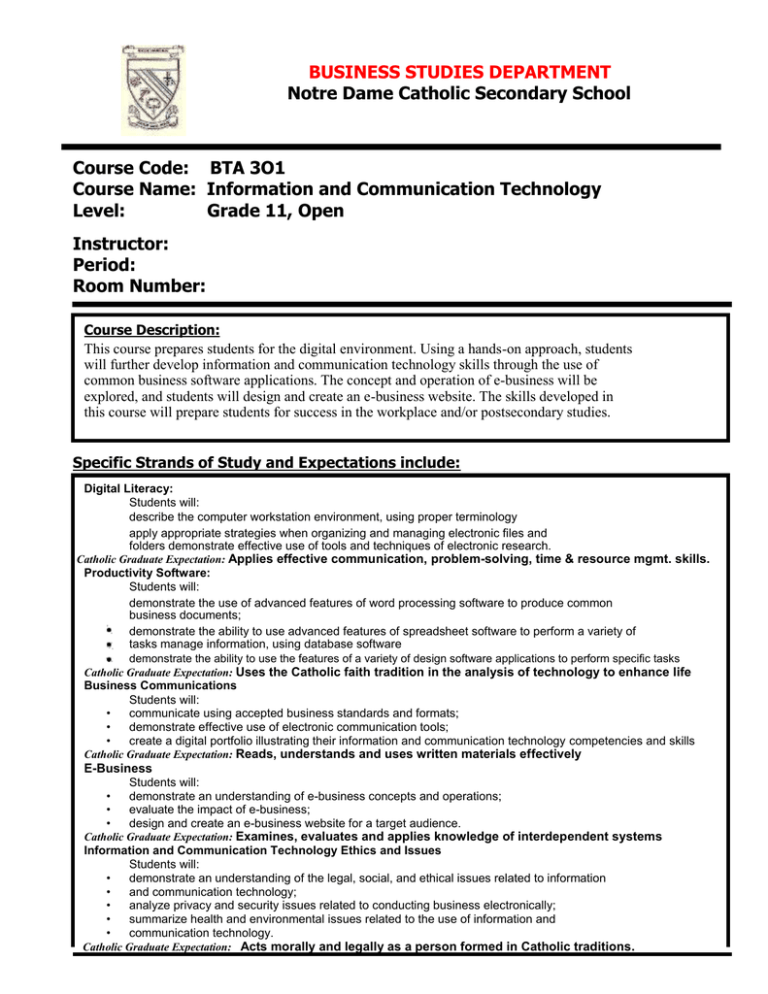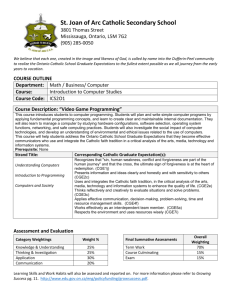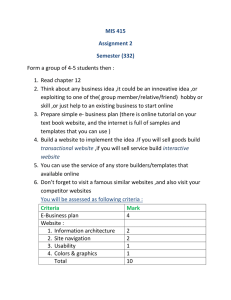BTA 3O1
advertisement

BUSINESS STUDIES DEPARTMENT Notre Dame Catholic Secondary School Course Code: BTA 3O1 Course Name: Information and Communication Technology Level: Grade 11, Open Instructor: Period: Room Number: Course Description: This course prepares students for the digital environment. Using a hands-on approach, students will further develop information and communication technology skills through the use of common business software applications. The concept and operation of e-business will be explored, and students will design and create an e-business website. The skills developed in this course will prepare students for success in the workplace and/or postsecondary studies. Specific Strands of Study and Expectations include: Digital Literacy: Students will: describe the computer workstation environment, using proper terminology apply appropriate strategies when organizing and managing electronic files and folders demonstrate effective use of tools and techniques of electronic research. Catholic Graduate Expectation: Applies effective communication, problem-solving, time & resource mgmt. skills. Productivity Software: Students will: demonstrate the use of advanced features of word processing software to produce common business documents; demonstrate the ability to use advanced features of spreadsheet software to perform a variety of tasks manage information, using database software demonstrate the ability to use the features of a variety of design software applications to perform specific tasks Catholic Graduate Expectation: Uses the Catholic faith tradition in the analysis of technology to enhance life Business Communications Students will: • communicate using accepted business standards and formats; • demonstrate effective use of electronic communication tools; • create a digital portfolio illustrating their information and communication technology competencies and skills Catholic Graduate Expectation: Reads, understands and uses written materials effectively E-Business Students will: • demonstrate an understanding of e-business concepts and operations; • evaluate the impact of e-business; • design and create an e-business website for a target audience. Catholic Graduate Expectation: Examines, evaluates and applies knowledge of interdependent systems Information and Communication Technology Ethics and Issues Students will: • demonstrate an understanding of the legal, social, and ethical issues related to information • and communication technology; • analyze privacy and security issues related to conducting business electronically; • summarize health and environmental issues related to the use of information and • communication technology. Catholic Graduate Expectation: Acts morally and legally as a person formed in Catholic traditions. Course Breakdown Resources:$ 99.00 The course will use a variety of resources including video, CD-ROM, Internet Applications and a variety of print sources. The textbook Unit 1 Hardware/Software Business Connections: Information Technology in Action will be distributed to students during Unit 2 Computer Networks the first week of the course. The text and all other resources assigned to students are the responsibility of the student. Any damage incurred will result in payment for replacement. Unit 3 Electronic Research, Communication and Ethics Unit 4 Electronic Business Unit 5 Security/Law and E-Business Evaluation Structure: Unit 6 IT Careers *Software applications are integrated throughout all units “Uses and integrates the Catholic faith tradition in the critical analysis of the arts, media, technology and information systems to enhance the quality of life” Semester Work: 70% Thinking Application Communication Knowledge/Understanding 20% 35% 20% 25% Final Evaluation: 30% Culminating Performance Task Final Exam 10% 20% Evaluation Policy Students will be assessed & evaluated according to the work produced & skills displayed. Methods of providing feedback will include assessing work in process & evaluating completed assignments, tests, co-operative learning activities, simulations and presentations. Peer & self-evaluations will also be utilized. Student marks will be determined by evaluating process & product according to 4 categories & 4 levels. Please see the chart below for specific skills and key words used to determine student competency in the different categories. Level Category Knowledge/Understanding Knowledge of facts & terms Understanding of concepts & relationships Thinking/Inquiry Critical thinking skills Creative thinking skills Inquiry Skills Communication Communication of ideas and information Use of symbols & visuals Oral & written communication Level 1: 50-59% Level 2: 60-69% Level 3: 70-79% Level 4: 80-100% -Limited display of knowledge, skills and ability to apply concepts -Some success in displaying knowledge, skills and application of concepts -Considerable display of knowledge skills and ability to apply concepts -Thorough understanding of concepts and ability to communicate, think creatively and apply concepts Application Applications in familiar contexts Transfer of concepts to new contexts Making logical conclusions and predictions Use of technology Making connections Feedback will also be provided for student learning skills. Skills like working independently, team work, organization, work habits and homework, and initiative are assessed independently student achievement and will be conducted through the use of a rubric indicating specific criteria to be achieved to receive each of the following letter grades: E –Excellent G – Good S – Satisfactory N - Needs Improvement Other Evaluation Issues LATE ASSIGNMENTS. Assignments submitted after the Primary Due Date established by the teacher will be accepted with a penalty of 5% off for the first day late, 3% for the second day late, 2% for the final day, to a maximum of 10%. This threeday Penalty Zone is the maximum time allowed for submissions. The third day after the assignment is due is considered the Closure Date upon which no further assignments will be accepted. If the teacher returns the marked assignments within the four day penalty zone, the date of return is considered the closure date. Repeated lateness in submissions indicates poor organization skills and will result in parental contact and will be reflected in the learning skills section of the report card. INCOMPLETE ASSSIGNMENTS. Assignments will be graded according to the extent with which they meet the criteria established in the rubric or evaluation structure. MISSED TESTS. Tests missed with a legitimate reason will be written within a few days of the student returning from the absence. Student eligibility to write the test and the date of writing will be at the discretion of the teacher in consultation with the department head. CULMINATING ACTIVITIES These activities will be due toward the end of the course. They are valued at 10 per cent of the final mark and will reflect course material and competencies not otherwise reflected on the final exam.



